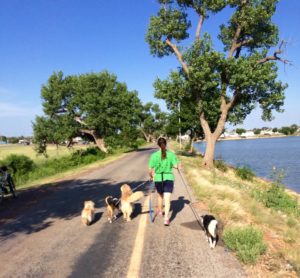What if I told you that your six week old puppy is at a serious disadvantage in life because he was taken too soon from his mother and littermates?
What if I told you the genetic factors were already in place with your dog’s aggression before she was even born?

Laura’s dogs that have taught her so much. From left to right: Chip, reactive rescue that used to attack vacuums and was food aggressive, Zoey, fearful of strangers, particularly men, had a “Caution” sign on her kennel door, Rocky, anxiety, and OCD behaviors eliminated with training, Emma, rarely handled–lived on a tie-out previously, bite history and was set to be euthanized. All happy and healthy family dogs!
What if I told you it wasn’t your fault your dog was attacked on a walk and now is reactive?
What if I told you your rescue dog was never abused or neglected, but improperly socialized and genetically fearful?
It is not your fault. Repeat it again. These things are out of your control. Genetics and environmental factors play such a role in behavior, we don’t even quite know how much (this is particularly true pertaining to genetics). So what can we do about it?
-Set realistic expectations for your dog. Everyone loves the dog that can go everywhere with ease. But does your dog actually enjoy it? Creating a relationship where you are aware of your dog’s state of mind is crucial. We have to be advocates for our dogs. Once you find things your dog truly enjoys, you’ve unlocked a whole new world of potential! And every dog is so different.
-Practice training homework with the goal of progress. Ending a session frustrated does not do any good for either of you. Instead, back track to something you know your dog is good at and try again next time.
-Reactivity never fully goes away. Ouch. I know. But it can be helped tremendously! (Ask us about whether your dog is reactive or not).
-“My rescue dog must have been abused because she’s terrified of men with beards.” Truth bomb time. It’s highly unlikely. Lack of socialization and temperament can and do create the perfect storm for fearful behavior to specific triggers.
The right training strategies can do wonders for your dog’s quality of life and your relationship together. Have questions for us? We welcome them! Oh, and it’s not your fault. 😉
Laura Neiheisel
